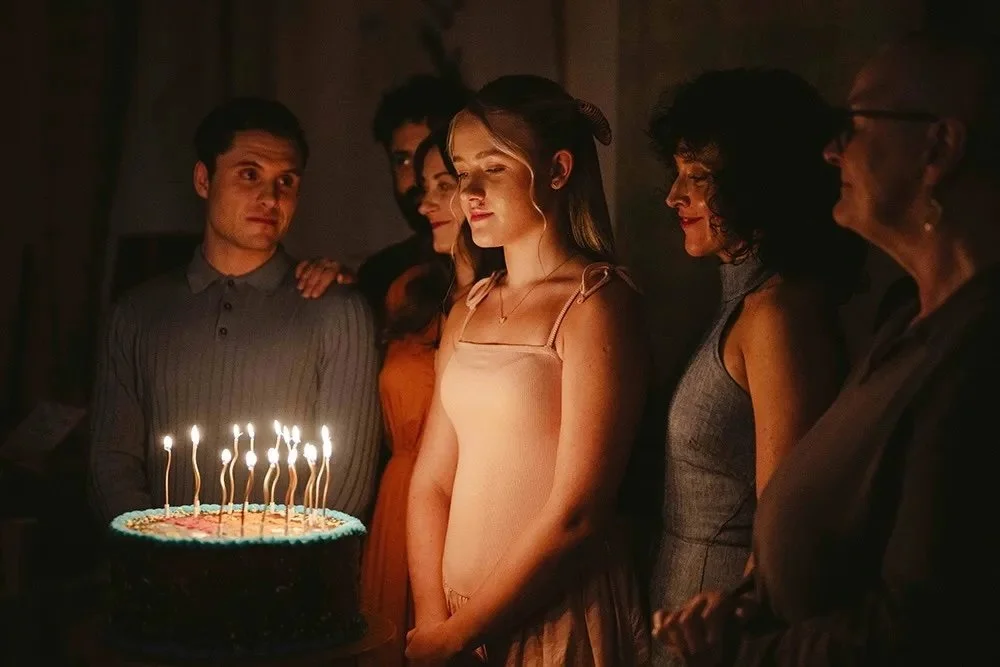TIFF25: “Retreat” is a White Knuckle Deaf Thriller
This review was originally published on Film Obsessive.
What’s been described as the world’s first Deaf thriller had its world premiere at the 2025 Toronto International Film Festival. Retreat is written and directed by Ted Evans in his feature film debut. The idea for Retreat was loosely inspired by a short film of the same name Evans made over a decade ago. The 2013 short film sees a Deaf woman caught in between a world on the verge of ruin and an isolationist commune in the English countryside. The key attribute that remains in the feature film is the isolated community with Deaf people at the center of the narrative. Retreat is an eerie thriller about the ways we seek to build community and the double-edged sword that can be.
Eva (Anne Zander) travels from Berlin to an isolated retreat in the English countryside that exclusively caters to Deaf people. She sees this journey as an opportunity to be surrounded by people who understand how unwelcoming the hearing world can be. Eva is brought to meet the person in charge of this retreat, an enigmatic woman named Mia (Sophie Stone). Everyone welcomes Eva with open arms and she finds herself drawn to a man named Matt (James Joseph Boyle). Like everyone else, Matt is Deaf, but unlike the rest of the adults, Matt grew up on the compound. He was the first child fully raised by Mia and knows nothing of the outside world. As Eva spends more time on the compound, she is introduced to Mia’s mysterious teachings called The Way.
Almost the entirety of Retreat is spoken in British Sign Language (BSL). There are moments when Eva reverts to German Sign Language because she’s only recently picked up BSL and Eva, who was taught to speak using her voice, has a few lines when she interacts with Hearing individuals. When we watch thrillers or horror movies, we have been trained to expect a cacophony of sounds. Musical stings to let us know we should be scared, screams from the characters when things get dire, and a usually unrelenting score. Retreat, while not technically a horror, strips almost all of that away. There’s an infrequent score that peppers itself throughout the film, but for the most part, the audience is immersed in the Deaf reality. For Hearing people, Retreat asks us to rewire our understanding of thriller movies and discover if we rely on the extra components of the film to sway the perception of our experience.
courtesy of TIFF
Retreat opens with a horrifying montage of black and white photos of young children in a school scenario. At first, the audience might not realize what they’re seeing and the historical connotations these photos hold. In the 1950s and prior, Deaf children were sent away to schools where they were not taught sign language, but often forced into verbal speech. They had loud instruments played into their ears to test their hearing and were subject to abuse when they were found to be speaking sign language. Retreat takes the idea of a safe haven for Deaf people and blends it with the history of isolated schools to create a film that muddies the viewer’s expectations in terms of what it means to create a haven.
Evans’ Retreat is the sort of identity-driven genre filmmaking that people have been begging for. It’s something wholly unique, a film that asks its viewer to evaluate the way that community can be twisted in coercion and control through a lens we haven’t gotten to see before. When Retreat bills itself as the world’s first Deaf thriller, they give the audience expectations, ones the film wholeheartedly meets. One can enjoy Retreat as a surface-level ride where a Scientology-esque organization has to deal with their carefully guarded isolation crashes into the rest of the world. Or, one can look at Retreat with all of the historical implications and the layers of lived experience that Evans imbued into the script to see the magnificent, intricate picture of something larger than a film. Either way, you’re in for a hell of a ride.
support your local film critic!
~
support your local film critic! ~
Beyond the Cinerama Dome is run by one perpetually tired film critic
and her anxious emotional support chihuahua named Frankie.
Your kind donation means Frankie doesn’t need to get a job…yet.
Follow me on BlueSky, Instagram, Letterboxd, YouTube, & Facebook. Check out Movies with My Dad, a new podcast recorded on the car ride home from the movies.

